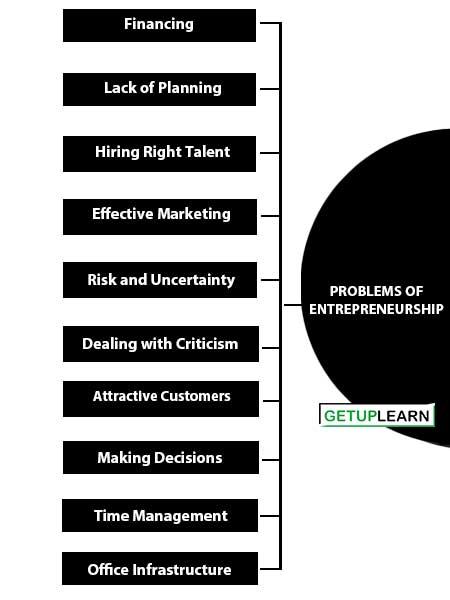Table of Contents
Problems of Entrepreneurship
Entrepreneurial activity is not a new concept, but still being started up as individual activity, has its own limitations. An entrepreneur faces lots of problems in undertaking any activity. So these are the problems of entrepreneurship discussed below:
- Financing
- Lack of Planning
- Hiring Right Talent
- Effective Marketing Within a Limited Budget
- Risk and Uncertainty
- Dealing with Criticism
- Attractive Customers
- Making Decisions
- Time Management
- Office Infrastructure

Financing
Getting funds for any activity is one of the main issues that all businesses face and have to tackle to survive. In spite of initial money being used for starting any activity will not be sufficient for survival for long.
Steady cash flow is crucial for businesses to endure, and extra funds to carry any activity ahead. Proper planning for the arrangement and allocation of funds is a pre-requisite requirement for any entrepreneurial activity.
Lack of Planning
Much entrepreneurial activity fails to grow because of a lack of initial planning. Key areas like sales, development, and funding aren’t afterthoughts. They need to all belong to any business plan right from the start.
Hiring Right Talent
Any business activity to be successful requires the right amount of numbers as well as the right potential. The entire success of any activity depends upon the manpower involved. But unfortunately getting the right talent is very difficult, as the skilled people supply is less than the demand.
Effective Marketing Within a Limited Budget
Being a new venture/start-up, it’s essential to create visibility among consumers. But targeting customers effectively has huge costs. Hence marketing the concept /product/service becomes a challenge for entrepreneurs. To do effective marketing with a limited budget is what an entrepreneur finds difficult.
Risk and Uncertainty
For first-time entrepreneurs, dealing with the uncertainties of the venture can be a tough task. Entrepreneurs can often feel ultimately responsible for the success or failure of their venture. There are also many detours and deviations from the initial plan.
All of this can take a toll on the entrepreneur. The VUCA environment that most new businesses operate in should be accepted as the reality and the changes accepted without much resistance.
Dealing with Criticism
For an entrepreneur, criticism comes as a part and parcel of the job. Every decision of the entrepreneur can be met with criticism by the team, partners, investors, customers, and even their families. Even established entrepreneurs such as Ratan Tata must deal with this.
Attractive Customers
Getting customers for your product or service can be the difference between success and failure for a business. Many businesses have started with powerful ideas however could not survive simply because they failed to reach the right customers.
Making Decisions
Decision-making in a business situation can be difficult, especially when there are so many things that need to be considered while taking on each decision. Entrepreneurs can face a dilemma while making a decision, especially when they have limited information.
Time Management
Even the best entrepreneurs struggle to manage their time properly. As they take up roles out of their expertise, they can find it challenging to get things done. The challenges often pop up when entrepreneurs have to deal with conflicting priorities.
Office Infrastructure
Workplace rent and associated costs are the first things that start with the generation & implementation of the idea. Any entrepreneurial idea that is there needs to have a setup and incur costs on such setup to start.
FAQs Section of Problems of Entrepreneurship
What are the problems of entrepreneurship?
These are the problems of entrepreneurship in modern business:
1. Financing
2. Lack of Planning
3. Hiring Right Talent
4. Effective Marketing Within a Limited Budget
5. Risk and Uncertainty
6. Dealing with Criticism
7. Attractive Customers
8. Making Decisions
9. Time Management
10. Office Infrastructure.
